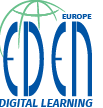
- This event has passed.
Dublin
June 28, 2011 @ 00:00
Different Perspectives on Sustainability
The issue of a socially and environmentally sustainable future is high on the global agenda. We now face problems of an exceptionally complex nature. Sustainability is therefore acquiring a new meaning as an inclusive concept, where its scope extends far beyond purely environmental dimensions.
Many policies and programmes now take on board a new vocabulary of sustainable development. This includes a range of environmental, financial, social or economic issues. Movements around sustainability and ecology in the past decade changed our approaches and thinking in radical and inclusive ways. Even in everyday actions, systems thinking is now stronger than ever. We can calculate an intellectual carbon footprint ? even for innovative e-learning…
Trends that capitalize new technologies in a sustainable way are now critically important. Moving consciously from quantitative towards qualitative growth, from technological evolution to innovation, implies the development of smart approaches for human-centered actions.
Sustainable strategies also include the flexibility offered by ICT-supported solutions. Smart use of ICTs in learning is one of the vital factors in making our world more sustainable. Learning always implies critical enquiry. Exploring the complexity of sustainability as well as its connected economic, political, social, cultural, technological and environmental aspects is central to this enquiry.
Sustainability is linked to mass collaboration. Critical understanding is linked to challenging and empowering individuals on a personal level. The web itself is a kind of ecosystem of innovation for learning. The sustainability scenario includes re-interpretation of mobility: being always connected by new generations of mobile devices, realizing virtual collaboration through e-infrastructures.
New Technologies and Openness for Sustainable Learning
The aim of the 2011 EDEN conference is to highlight different ways and approaches, in order to integrate better the concept of responsible and sustainable development within learning, in its widest sense.
The links between sustainability and the world of learning and education are numerous and natural. Embedding learning as a critical factor in the diversity of socio-economic settings plays an important and acknowledged role in strategic viability and impact. We can visualize the relationship between sustainability and learning in many contexts. E-learning, learning innovation, open learning, ICT enhanced learning, so called atypical learning forms: all are modernization factors enhancing the ecological consequences of technical development. The main elements of the sustainable professional learning toolkit include: good instructional design, user-friendly learning environments, responsible use of technologies, informal learning, accreditation of prior learning experience.
Among the elements which sustain and shape our quality of life and well-being, the issue of ?eco-design? of learning spaces ? including e-learning ? is central and also closely connected to creative aspects and the arts which further broaden this paradigm.
Aspects around equality and access are nowadays increasingly being understood and treated with deepened sensitivity and importance. Equal opportunities and socially inclusive outcomes are emerging as key aspects of social sustainability ? particularly evident as part of intergenerational approaches and access. We therefore need to revisit how e-learning may contribute to increasing quality of opportunity, empowering participation in the sustainable learning communities of the future.
Sustainable e-learning linked to professional development is based on organic organizational and pedagogic perspectives, while using ecologically appropriate technological solutions. In this context, it is most important to conceptualize and analyze the changing nature of learning ? including lifecycles of learning and knowledge and their methods and paradigms. This connects naturally to the conscious use and re-use (recycling) of learning objects, in a matrix of organic sustainable development.
Sustainability and openness go hand in hand. Transformed approaches around access to information, resources and knowledge in the digital world have fundamentally changed business models, structures and processes. Sustainability and openness together represent collaborative creativity, connectivity, access and transparency – while also maintaining a balanced, flexible and dynamic level of operation.
High rates of change, due to information technology development and the momentum of innovation in e-learning, mean we must seriously approach sustainability of the culture and community of e-learning. Education has an essential role to play in motivating and empowering people to participate in more sustainable lifestyle changes. Thus the role of innovative learning and training as critical awareness raising factors for global sustainability links organically to education around understanding the contexts of ecological challenges and opportunities.
The Keynote Speeches
The presentations of the keynotes are available in the Publications section of the website.
The Recordings of the keynote sessions are available here.
